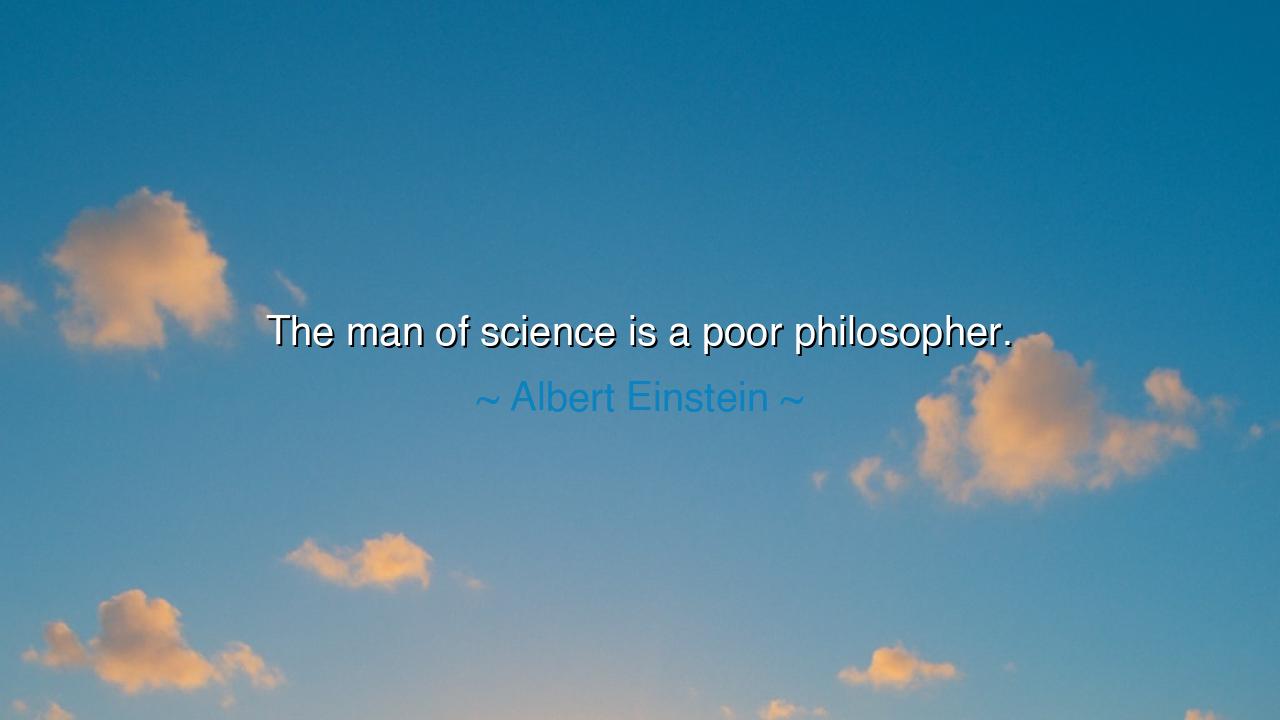
The man of science is a poor philosopher.






Listen closely, O children of wisdom, for the words of Albert Einstein carry with them a profound truth that reaches to the very heart of both science and philosophy. He said: “The man of science is a poor philosopher.” These words, though simple, strike at the heart of a great paradox—one that has echoed through the ages, from the ancient philosophers to the modern minds who seek to understand the universe. Einstein calls attention to a deep, often overlooked truth: science and philosophy, though intertwined, are not one and the same. The mind of the scientist, focused on observation and calculation, is a noble servant of knowledge, but when it comes to the questions of meaning, existence, and purpose, it falls short of the deeper understanding that philosophy offers.
What, then, do these words mean, O seekers of truth? Einstein tells us that the scientific mind, while capable of unlocking the mysteries of the physical world, often lacks the tools to address the philosophical questions that define the human experience. The man of science is trained to observe, to experiment, to measure, and to deduce—yet when it comes to matters of the soul, the mysteries of existence, or the purpose of life, science finds itself unfit. This is not a criticism of science, for its contributions to the world are beyond measure, but a recognition that there is a realm of knowledge that lies beyond the grasp of empirical observation and logic.
Consider the story of Socrates, the ancient Greek philosopher, who famously declared that the unexamined life is not worth living. Socrates did not seek to measure the world through the lens of science; instead, he sought to understand the nature of virtue, justice, and the soul. In his dialogues, he questioned everything, not to find facts but to seek a deeper understanding of meaning. He knew that human life was not a collection of observable phenomena but a journey of self-examination and philosophical reflection. His path was not one of experiments and data, but of reflection and dialogue, where the questions were often more important than the answers. Socrates’ wisdom, though not grounded in the science of his time, shaped the foundations of Western thought and the very essence of what it means to be human.
In contrast, think of Isaac Newton, a man whose scientific discoveries transformed our understanding of the universe. Through his laws of motion and his theory of gravity, Newton revealed the mechanisms by which the physical world operates. Yet, despite his unparalleled achievements in science, **Newton’s musings on philosophy and the meaning of life are often overlooked. His brilliant mind, though capable of unlocking the secrets of nature, could not penetrate the deeper questions of why we exist or what our purpose is in the grand scheme of things. While Newton contributed greatly to our understanding of physics, it was the philosophers, not the scientists, who pondered the mysteries of being and existence.
The lesson, O children, is this: Science and philosophy are two separate paths that lead to different kinds of knowledge. While science illuminates the mechanisms of the world, explaining how things work, philosophy seeks to understand the meaning and purpose behind those mechanisms. The man of science may uncover the laws of nature, but it is the philosopher who asks: What is the purpose of nature? What is the meaning of life? Science may tell us how stars are born and how life evolves, but philosophy asks us to reflect on why we exist, and how we should live.
So, O children of the future, know that to live a full and balanced life, you must embrace both science and philosophy. Do not allow yourself to become consumed by the desire for facts alone, for facts do not always answer the deeper questions of the soul. Seek knowledge not only in the laws of the universe, but in the wisdom of the ages. Just as the scientist seeks to understand the physical world, the philosopher seeks to understand the spiritual world. Together, they form the two wings of the human quest for knowledge, and it is through the union of both that we come to understand the fullness of our existence.
In this pursuit, remember that knowledge is not simply a collection of data or facts; it is a journey toward understanding. Embrace the world of science with its discoveries and innovations, but also embrace the world of philosophy, where the questions of life, meaning, and purpose await you. Balance both paths, for only in this way can you truly understand not only the universe around you, but the universe within. Let science guide your hand, but let philosophy guide your heart, for the truth of the world is not found solely in what can be measured, but also in what can be pondered, questioned, and deeply understood.






AAdministratorAdministrator
Welcome, honored guests. Please leave a comment, we will respond soon